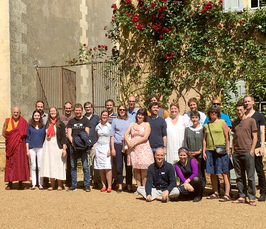The First MLE Hub Meeting of the European Neurophenomonolgy, Contemplative, and Emobied Cognition Network (ENCECON Workshop)
Workshop
- Start: Jun 6, 2016
- End: Jun 10, 2016
- Location: Château de la Bourlie, France
- Host: Mind and Life Europe
- Contact: office@mindandlife-europe.org

The workshop was be a residential 3-day retreat to facilitate an in-depth and integrated exploration into the areas of embodied cognition, contemplative neuroscience, and neurophenomenology.
More specifically, this workshop explored three key topics:
1) The Role of the Brain Resting State in Meditation
What is the functional meaning of brain resting states networks (i.e., default-mode networks) in relationship to mental states (i.e., mind-wandering, mindfulness, cube of thought, etc.), per- sonality traits, and self-related processes? What is the relationship between different styles of contemplative practice and these main brain networks?
2) The Role of the Body in Meditation
What is the relationship between meditation, interoceptive body awareness, and the brain? What is the role of bodily posture and physical relaxation in inducing and maintaining mental states (i.e., stillness and ease of the mind, mind-wandering, rumination, etc.)? What are the potential confounding effects of psychophysiological changes (i.e., heart rate, respiration rate, etc.) associated with different experiential states on neuroimaging measures, including BOLD fMRI and electrophysiology?
3) Neurophenomenology
What are the methodological challenges in collecting and analyzing first-person data in conjunc- tion with third-person data? How to refine the terminological framework to capture experiential processes in furthering neurophenomenological and computational approaches to the study of mind and its embodiment? How to develop statistical tools for the analyses of first-person quali- tative data and integrate those with classical 3rd person brain or physiological data.
This first ENCECON Workshop is organized by Mind and Life Europe in cooperation with the De- partment of Social Neuroscience from the Max Planck Institute for Human Cognitive and Brain Sciences in Leipzig (Tania Singer), the Institute of Psychiatry, Psychology and Neuroscience at King’s College London (Elena Antonova), the Mood Disorders Centre at the University of Exeter (Thorsten Barnofer) as well as the Lyon Neuroscience Research Center (INSERM U1028 - CNRS UMR5292) from Lyon 1 University (Antoine Lutz).

